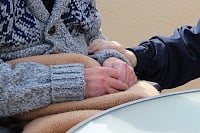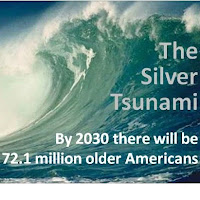California ordered nursing home operators to admit patients with the coronavirus. But that was just the tip of the iceberg: many states issued similar orders, and within days COVID-19 death tolls in skilled nursing facilities rose. Why?
After weeks of warning Californians about the deadly threat posed by the coronavirus (COVID-19) to nursing home residents, the State of California ordered nursing home operators to admit, and/or readmit, COVID-positive patients into their facilities.
A March 30, 2020 directive from the California Department of Public Health to skilled nursing facilities states: “SNFs shall not refuse to admit or readmit a resident based on their status as a suspected or confirmed COVID-19 (coronavirus) case.”
California issued the directive as coronavirus outbreaks spiked in dozens of nursing homes throughout the state, including Laguna Honda in San Francisco, the state’s largest facility. The state continued to refuse to identify nursing homes with outbreaks, however, leaving residents to worry they are at immediate risk of infection and death.
Advocates say order was ‘death sentence’
“Sacrificing the lives of beloved nursing home residents is beyond unconscionable” said Patricia McGinnis, CANHR’s executive director. “California’s directive is nothing less than a death sentence for countless residents. The state should instead look to alternative locations such as hotels and conference centers as much safer places to send COVID-19 patients for care.”
The California Advocates for Nursing Home Reform (CANHR) organization
contends the directive further endangers residents by waiving both minimum staffing requirements and occupancy limits for skilled nursing facilities. “Cramming infected patients into crowded, understaffed facilities with extraordinarily vulnerable residents is a recipe for disaster,” the organization said in a release.
“California nursing homes are virtually unmonitored right now. Routine inspections and investigations have been cancelled. Most inspectors have been reassigned to desk duties. Ombudsmen are locked out of facilities as are family members, friends and other visitors who might at other times sound the alarm when residents are neglected. There are no witnesses to the suffering residents are enduring as they get sick and die alone.”
Nursing homes understaffed nationwide
In New York and New Jersey, the situation is similar, with already understaffed nursing homes facing an increasing workload as employees call in sick or themselves become quarantined. In some places, staff who were sick with the virus were coming to work anyway, and carrying the illness from one patient to the next, infecting healthy residents throughout the facility.
Nearly 2,500 long-term care facilities in 36 states are battling the COVID-19 novel coronavirus, according to a survey taken April 10 by NBC News.
Based on responses from 24 states, there have been 2,246 deaths associated with long-term care facilities alone; and that is estimated to be an “underestimate” because nearly half of the states either declined to provide data on nursing home deaths, said they did not track such data, or said they could do so. Those deaths that were documented took place in New York, New Jersey, Connecticut, Washington state, Louisiana and Illinois. Some also included staff members.
Who’s responsible for oversight?
The federal Centers for Medicare and Medicaid Services, (CMS) which is tasked with overseeing long-term care facilities, told NBC News that states must comply with state and local reporting requirements for COVID-19 cases.
CMS referred NBC News to the CDC. The Centers for Disease Control and Prevention (CDC) declined to comment.
Nevertheless, despite the lack of specific data, it is clear that nursing homes in more and more states are finding it difficult to keep their residents alive in the face of the COVID-19 pandemic.
Nursing home operators on front lines
As ongoing research continues to underscore the deadly risk senior citizens face from the COVID-19 coronavirus, it becomes increasingly obvious that nursing home operators are indeed on the front lines of an ongoing battle to keep their residents healthy while managing to maintain their bottom line with a modicum of morality.
The California Association of Health Facilities, which represents a large percentage of skilled nursing facilities in the state, warned in a statement at the start of April that many nursing homes lack vital supplies to protect their patients from COVID-19.
“Under California law, facilities are not required to admit any patient if they are unable to meet their needs, and right now we can’t meet patient needs,” said the statement, which came in response to the California state directive to send some patients with COVID-19 home from the hospital, back to the nursing facilities.
Between a rock and a hard place
Industry officials and advocates for nursing home reform reiterate their fears that their vulnerable residents, already at risk due to their age and underlying health conditions, will be further endangered due to a lack of adequate staff and PPE (personal protective equipment) with which to care for the influx of COVID-19 positive patients who allegedly do not require hospital care but still require assistance.
In truth, nursing homes find themselves between a rock and a hard place.
They have to protect their “healthy” but extremely fragile residents, and they still are being forced to contend with new and returning residents carrying an infectious virus that is by all accounts contagious and spreads like wildfire.
In California, there are more than 1,000 skilled nursing facilities that provide long-term care. The March 30 order from the California Department of Health bluntly warned skilled nursing homes “shall not refuse to admit or readmit a resident based on their status as a suspected or confirmed COVID-19 case.”
The only saving grace in the order was the caveat that came from the state two days later, adding that patients cannot be sent to any nursing home (1) without prior consultation with a local health official, and (2) the nursing home must have “adequate supplies” and follow federal guidelines for care of COVID-19 patients.
But item number 2 provides an “out” — there was no specific definition of the term “adequate supplies” and one can easily duck the order if one simply fails to follow the federal guidelines for care of a COVID-19 patient. Of course, that facility might then risk losing Medicare funding – but if it is a private facility, owners may consider it worth the gamble, dangerous a game though it may be.
Difficult dilemma faced by administrators
It’s not only California facing this dilemma of being faced with state-mandated COVID-19 admissions, whether or not the facility was ready.
New York State also joined the cause, and on March 25 had already issued a statewide advisory barring nursing homes from denying admission or readmission to residents “solely based on a confirmed or suspected diagnosis of COVID-19.”
By April 2, there were nearly 2,000 confirmed cases of the coronavirus linked to outbreaks in the nation’s more than 15,000 nursing homes and long-term care facilities across America, where more than one million senior citizens spend their days. According to a report by The Associated Press, there were at least 450 deaths as well. Is there a connection? It’s impossible to know.
What is known, what to do about it
But here’s what is known — the numbers were expected to climb before they dropped, for a number of reasons:
- More workers are testing positive and being required to self-quarantine, leaving fewer to do the work.
- More workers are also staying home with children due to the current shutdowns, also leaving fewer to work.
- There were many workers who may have been asymptomatic but nevertheless infected and whose status went undetected, spreading the virus to coworkers and patients alike. Some worked at multiple facilities, spreading the virus even further.
- As stated above, senior citizens are at much higher risk of contracting COVID-19 and dying from the virus than the rest of the population, according to all studies on the subject carried out thus far.
Action steps to consider
Can skilled nursing homes and long-term care facilities adequately gear up to take on the challenge of caring for seniors who suffer with this vicious illness?
It’s not clear. Budget cuts, a crashing economy, staffing issues and lack of equipment are all legitimate reasons to place an owner in an untenable position, regardless of directives, state orders and social pressures – possibly forcing some owners to simply toss in the towel and close altogether.
Some people have removed their loved ones from facilities that appear unprepared due to fears of infection, and opted for private care or alternative placement, but that’s not always possible.
Here’s a list of possible action steps one might consider in this difficult situation:
- Move your loved one home.
- Talk to the nursing home to determine the specific policy in place and get a fix on what’s happening; ask for notification before a COVID-19 positive patient is actually admitted. (This may or may not be feasible.)
- Find a backup nursing home right now.
- Talk to your loved one’s doctor.
Opportunity for Truth, Kindness
There are no easy answers and this pandemic has provided no good solutions to anyone. What it has provided, however, is an opportunity for truth, kindness, understanding and tolerance on all sides.
The more positive qualities we can see in each other, the fewer obstacles we are likely to see as we try to make our way through the rest of the nightmare that lies ahead.
We need to be able to meet this challenge together, and everyone’s skills are needed – including those of the administrator on the other side of the desk.
Wishing all of our readers a safe, healthy, successful day.





This article was painful for me to read, and hurtful to those of us who are trying to do the right thing. My dad contracted COVID in the facility where he has lived for three years. He is a person with rights too, not just a problem to be shuffled off somewhere. He did nothing wrong.